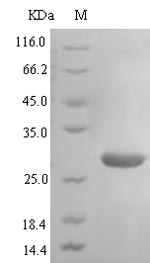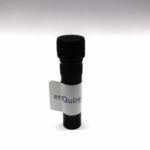Human Atypical chemokine receptor 3 Recombinant Protein Product Attributes
Product Type: Recombinant Protein
Recombinant Atypical chemokine receptor 3 based upon sequence from Human
Host: QP5898 protein expressed in E. coli.
Tag: His-SUMO
Protein Construction: A DNA sequence encoding the Homo sapiens (Human) Atypical chemokine receptor 3, was expressed in the hosts and tags indicated. Please select your host/tag option, above.
Recommended Applications: Immunogen, Protein Standard, Cell culture, or Other Cell Biology Applications.
Application Notes: Please contact us for application specific information for QP5898.
Bioactivity Data: Untested
Full Length? Partial (see sequence information for more details).
Expression Region: Met1 – Lys40
Amino Acid Sequence: MDLHLFDYSE PGNFSDISWP CNSSDCIVVD TVMCPNMPNK
Purity: Greater than 90% as determined by SDS-PAGE.
Reconstitution Instructions: Concentrated protein in liquid format. Reconstitution is not necessary.
Concentration of Human Atypical chemokine receptor 3 Protein:
Endotoxin Levels: Not determined.
Buffer: Tris-based buffer, 50% glycerol
Storage Conditions: Store at -20C to -80C.
| Recombinant Human Atypical chemokine receptor 3 Protein General Information | |
|---|---|
| Alternate Names | |
| RDC-1, CXC-R7, GPR159, RDC1, CXCR7, CMKOR1, CXCR-7 | |
| Curated Database and Bioinformatic Data | |
| Gene Symbol | ACKR3 |
| Entrez Gene ID | 57007 |
| Ensemble Gene ID | ENSG00000144476 |
| RefSeq Protein Accession(s) | NP_064707.1 |
| RefSeq mRNA Accession(s) | NM_020311.2, XM_005246097.2, XM_005246098.3, XM_017004516.1 |
| UniProt ID(s) | P25106 |
| UniGene ID(s) | Hs.471751 |
| HGNC ID(s) | HGNC:23692 |
| COSMIC ID Link(s) | ACKR3 |
| KEGG Gene ID(s) | hsa:57007 |
| PharmGKB ID(s) | PA162383053 |
| General Description of Recombinant Human Atypical chemokine receptor 3 Protein. | |
| Atypical chemokine receptor that controls chemokine levels and localization via high-affinity chemokine binding that is uncoupled from classic ligand-driven signal transduction cascades, resulting instead in chemokine sequestration, degradation, or transcytosis. Also known as interceptor (internalizing receptor) or chemokine-scavenging receptor or chemokine decoy receptor. Acts as a receptor for chemokines CXCL11 and CXCL12/SDF1. Chemokine binding does not activate G-protein-mediated signal transduction but instead induces beta-arrestin recruitment, leading to ligand internalization and activation of MAPK signaling pathway. Required for regulation of CXCR4 protein levels in migrating interneurons, thereby adapting their chemokine responsiveness. In glioma cells, transduces signals via MEK/ERK pathway, mediating resistance to apoptosis. Promotes cell growth and survival. Not involved in cell migration, adhesion or proliferation of normal hematopoietic progenitors but activated by CXCL11 in malignant hemapoietic cells, leading to phosphorylation of ERK1/2 (MAPK3/MAPK1) and enhanced cell adhesion and migration. Plays a regulatory role in CXCR4-mediated activation of cell surface integrins by CXCL12. Required for heart valve development. Acts as coreceptor with CXCR4 for a restricted number of HIV isolates. | |
Limitations and Performance Guarantee
This is a life science research product (for Research Use Only). This product is guaranteed to work for a period of two years when stored at -70C or colder, and one year when aliquoted and stored at -20C.





There are no reviews yet.